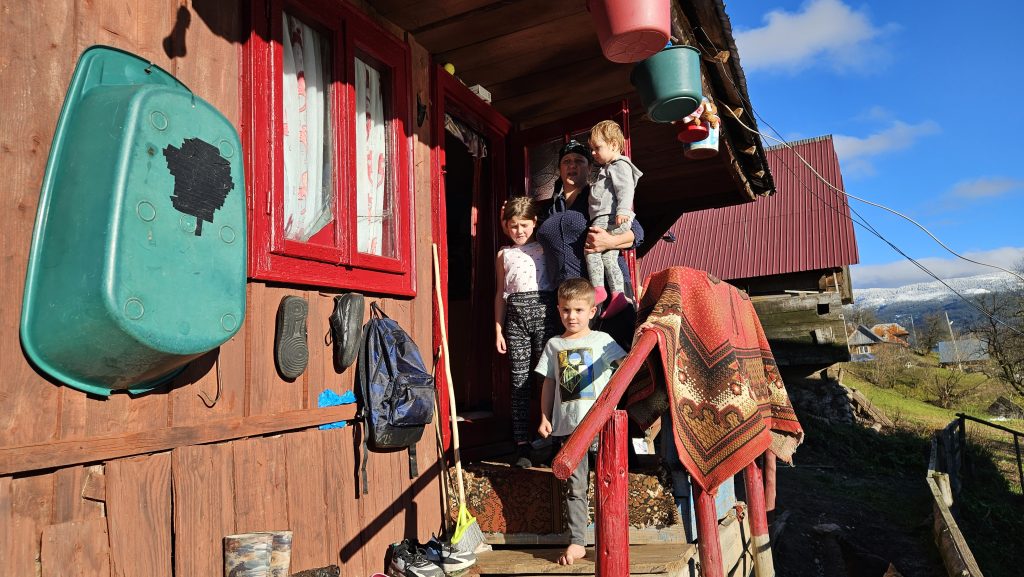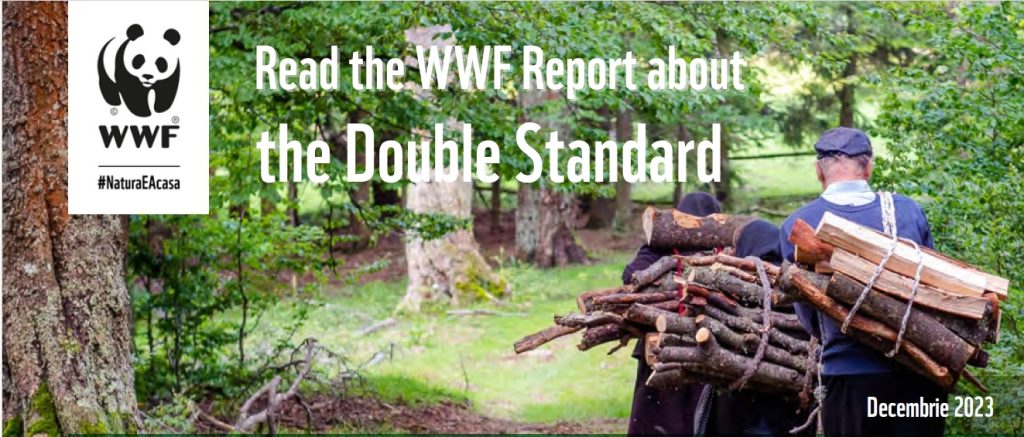Local communities in rural areas, the most affected by energy poverty, pay full price for the firewood they use for heating and cooking, while citizens benefit from Government subsidies for gas and electricity bills. In the midst of winter, authorities emphasize social inequality and refuse to help the more than 2.5 million households that use wood for heating, which count for 85% of the rural area. Instead, they practice a Double Standard, which means they give subsidies to one category of the population and ignore another, even though both face the same problem. The solution is for firewood to be subsidized conditionally.
The first snow had just covered the peaks of the Maramures Mountains, in the very north of Romania, when we arrived in Uloha, a mountain village on the border with Ukraine. The 2.5 kilometer dirt road, from the asphalt to up here, seemed never-ending. As we drove up, the road got muddy and narrow and, as we passed by a horse-driven cart carrying wood, the car wheel got so close to the edge of the ravine that small stones began to fall downhill.
The road ends 500 meters before reaching Aunt Ioana's house. If you have a 4×4 wheel car and it's dry outside, you have a chance to continue driving. If not, this is where mud heaven begins. That's why all the villagers who live above this point have a horse and a cart to carry their food and, of course, their wood.
Aunt Ioana is less than 50 years old, but already has 5 boys and 4 grandchildren, whom she raises almost by herself. Her husband is away, working in Germany, and comes home twice or three times a year. She talks a lot, loudly and smiles often. “That's our way of life. Women and grandparents stay with the children and raise animals. Wood? We live in the forest and they force us to pay 500 lei for firewood and bring it from downhill, where they unload it. I carry it uphill by myself, otherwise I would pay another 100 lei for transport”, she says while sitting on her porch, in a mountain village surrounded by forests.
All the 3,500 households in Poienile de sub Munte, the commune the Uloha hamlet belongs to, heat with wood. Three-quarters of the locals are so poor that receive „heating aid” from the state, as they fall under the category of vulnerable population. But they can use this money to buy firewood at a very high price, while vulnerable people who heat with gas or have central heating, mainly located in the city, receive the same kind of help, which is applied to an already subsidized price.
The vulnerable consumers’ drama
These are the typical rural consumers. Vulnerable. Nobody subsidizes them, although they also contribute to the state budget. Their voice, of those located in distant villages, is not heard. Politicians seem to want to help the more vocal townspeople and subsidize their gas and electricity bills. But, in fact, they generate huge profits for certain economic operators. In the end, the subsidized bills, which choke the state budget, are paid by all Romanians – including by those living in the countryside, who do not benefit from these subsidies – at the highest prices in the EU.
The existing subsidy does not apply, therefore, to villagers like those from Uloha, which count for 2.5 million households. Because they don't have a gas network, they still heat with wood. The authorities are not helping exactly those who are most affected by energy poverty. The recent decision to start the „Old Stove” program is very good, but not enough.
What are these people forced to do to survive? To buy wood on the black market, delivered to their homes some „kind person”. He knows where from. Everyone is on its own and does what one has to do to keep its family warm. Who loses? People who were not lucky enough to have a modern energy infrastructure on their street. The forest, because illegal logging is encouraged. The forestry bio-economy, because quality wood ends up being used as firewood. And the Romanian state, because it does not collect taxes if the wood is untaxed and because it promotes policies that fuel the erosion of the rule of law.
The advantages of subsidizing firewood
The government tried to solve the firewood problem last year by capping its price, which led to an avalanche of negative side effects such as the growth of the black market and to export and price increases. However, the solution is different: as the authorities have already decided to subsidize gas and electricity bills, then they should also subsidize firewood acquisition. In addition, the „heating aid”, given to the disadvantaged people, should be used to buy the subsidized wood, not the expensive one, as is the case now.
The subsidy should only be valid if the villagers show the tax receipt, which proves that they have legally bought the firewood. Thus, without creating distortions in the market, the state would be able to lower the black market because the subsidized wood would be cheaper than the illegal one. In addition, wood and wood-derived products for home heating should be conditionally subsidized in order to encourage the use of dry/chipped wood or briquettes/pellets. This way, Romania would invest in a forest infrastructure that can contribute to increasing energy efficiency, decarbonization and reducing air pollution. Moreover, the state would be able to recover part of its money through taxation and would reduce illegal logging, which is mainly used for firewood. It would be a state aid that could generate a win-win situation.
The iron gate at Aunt Ioana's house closes with a sharp creak and we walk up the road amid mud, goats, chickens and cows. The village thrives with life. In a yard, a puppy runs around a few pairs of rubber boots put on a doormat. An 8 year-old boy, wearing high boots, jumps cheerfully through the mud and runs on a narrow path. Uphill, near the end of the village, is the school. Old, made of wood, with brightly painted windows.


